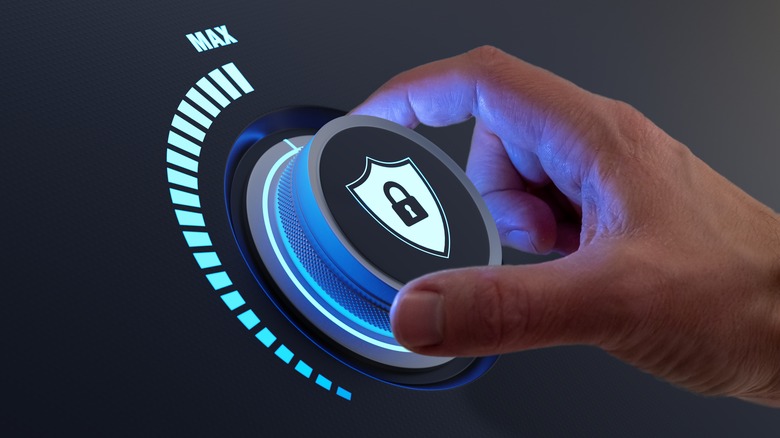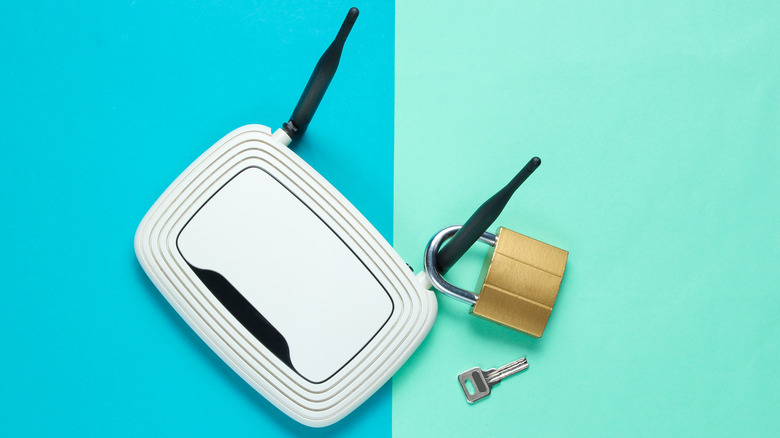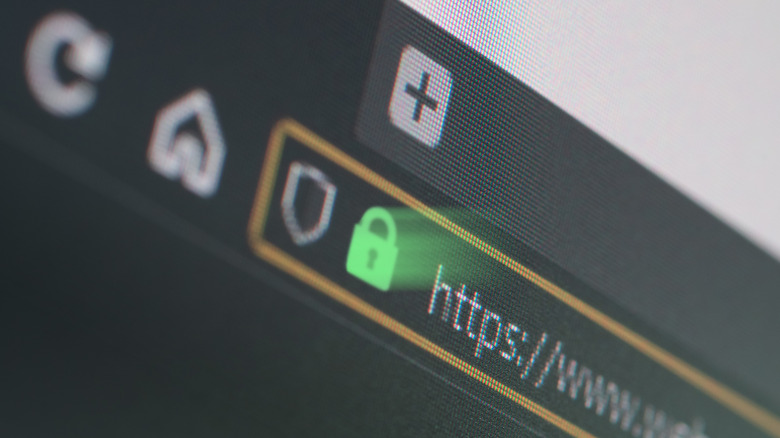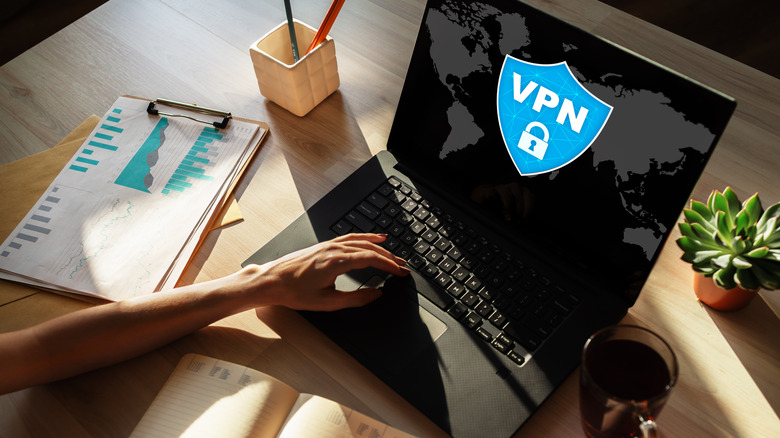

Why You Should Encrypt Your Wi-Fi Network (And How To Do It)
source link: https://www.slashgear.com/1246804/why-you-should-encrypt-your-wifi-network-how-to/
Go to the source link to view the article. You can view the picture content, updated content and better typesetting reading experience. If the link is broken, please click the button below to view the snapshot at that time.

Why You Should Encrypt Your Wi-Fi Network (And How To Do It)

As more and more people's lives move online, securing your digital fortress cannot be overstated. The most crucial component of this cyber defense is Wi-Fi network encryption — a seemingly simple, yet critical element in protecting personal information and thwarting cybercriminals. Without encryption, every device connected to the Wi-Fi network is vulnerable to unauthorized access, jeopardizing users' privacy, data, and safety.
Wi-Fi encryption is a digital barrier, shielding the network and connected devices from eavesdroppers and hackers. It safeguards the integrity of the data transmitted between devices, ensuring only authorized users can access and decipher the information. Encrypting a Wi-Fi network may seem complex, but even the least tech-savvy individuals can quickly fortify their digital domains with the proper guidance.
To truly understand why Wi-Fi encryption is so important, you should first acknowledge the risks that an unsecured network poses. Cybercriminals are adept at exploiting these vulnerabilities, gaining unauthorized access to sensitive information, such as financial details, personal correspondence, and even surveillance footage. As a result, hackers can compromise privacy, leading to devastating consequences like identity theft, financial loss, and blackmail.
Several encryption standards and protocols are available to help users secure their Wi-Fi networks: WEP, WPA, and WPA2. Each offers unique advantages and levels of security. WEP is an older, less secure standard, while WPA and WPA2 provide improved protection. WPA3, the latest encryption standard, offers even more robust security features.
Why encrypt your Wi-Fi network?

Encryption is just a fancy name for Wi-Fi that is password protected, so don't let the technical jargon confuse you. More generally, encryption is a method of scrambling data to the degree that outside parties cannot decipher it, preventing unauthorized access and safeguarding your data.
Cybercriminals can exploit unprotected networks, employing diverse techniques to infiltrate and exploit vulnerabilities. Some of these methods include eavesdropping on data transmissions, carrying out man-in-the-middle attacks to intercept or manipulate data, and gaining unauthorized entry to the network and connected devices.
You've probably heard of ransomware attacks in the news in recent years. These attacks have emerged as a prominent and devastating form of cybercrime, underscoring the importance of robust network protection. Ransomware is malicious software that locks or encrypts a victim's data, with perpetrators demanding a ransom in exchange for a decryption key.
In 2021, the Colonial Pipeline fell victim to the DarkSide ransomware group, causing a disruption in fuel supplies throughout the United States. Colonial Pipeline paid a $4.4 million ransom to regain control of its systems, showcasing the potential impact of ransomware attacks on critical infrastructure.
Securing your Wi-Fi network with encryption is indispensable for thwarting cybercriminals and preventing them from exploiting vulnerabilities and inflicting considerable harm. Users can preserve their privacy, protect valuable data, and minimize potential threats by understanding the risks and adopting appropriate security measures.
How to encrypt your Wi-Fi network

There are several methods for protecting your network from cybercriminals. Fortunately, the process is straightforward, regardless of whether you have an older traditional router or a more modern mesh system.
The encryption process typically begins with accessing the router's configuration page for conventional router setups.
- To do this, open a web browser and enter the router's IP address, commonly found in the user manual or on a label affixed to the device.
- Once entered, you'll see a screen to provide login credentials, often set to default values (usually "admin" for username and password) unless previously modified.
- After successfully logging in, navigate to the wireless settings section, where you'll find the encryption options.
- Choose the most secure encryption standard, ideally WPA3 or WPA2, and create a strong and unique password.
The process is slightly different for users of mesh Wi-Fi systems, such as Eero. These systems often have accompanying mobile apps that allow for easier network management.
- Download and install the mesh system's app on your smartphone or tablet.
- Sign in to your account and select the network you want to modify.
- Navigate to the security options, typically under "Wi-Fi settings" or a similar menu.
- Choose the highest level of encryption available (WPA3 or WPA2) and create a strong password.
- Save the changes and update any connected devices with the new password.
It's always a good idea to change passwords over time. Consider setting reminders to revisit this process once or twice a year.
Other steps to secure your Wi-Fi network

In addition to encryption, there are several measures you can take to bolster the security of your Wi-Fi network, making it more resilient to cyber threats. Updating your router's firmware is vital for maintaining its performance, closing security loopholes, and benefiting from the latest features.
To do this, consult your router's user manual or manufacturer's website for specific instructions. Often, this process involves logging into the router's configuration page, navigating to the firmware update section, and following the prompts. Some routers offer automatic updates, so enabling this feature is recommended.
You can also achieve another layer of security by exclusively visiting "HTTPS" websites. The HTTPS protocol encrypts data exchanged between your browser and the website you are visiting, protecting sensitive information from interception. To ensure you only visit HTTPS sites, look for a padlock icon in your browser's address bar, indicating the secure connection. Additionally, consider installing browser extensions, such as HTTPS Everywhere, that automatically redirect you to the HTTPS version of a site when available.
In addition, you should disable remote management on your router. While it may sound helpful, this option allows router access from external networks, which hackers can exploit. Turning it off ensures that only devices connected to your network can access the router's settings.
VPNs May Not Be As Safe As You Thought
The internet is a much more secure place than it once was. Everything online — from banking services to online shopping and social media platforms — is encrypted. But the internet is also much less privacy-friendly than it used to be. Advertisers follow users around the web, tracking their moves across different sites and devices. The data collected from this intrusive mining is either used for targeted advertising or sold to brokers. Luckily, you can stop some ad personalization.
Here's where the recent VPN boom comes into play. VPN services have grown into a multi-billion dollar industry, built on bold promises of better safety and security from prying eyes (via Statista). Their marketing typically promises to anonymize users, hide them from prying eyes, and secure them against malicious hackers, but VPN services aren't the magic solution the companies would like you to believe. Commercial VPNs can actively compromise your security and privacy in some ways — in fact, outside of a few scenarios, you might not need a VPN, and that's not even touching on the issue of common myths about the technology.
How does a VPN work?
Virtual private networks (VPNs) work by creating a tunnel for your internet traffic. On one side of this tunnel is the user's device, and the other end opens into the servers that the VPN company operates, ones that may be located in a different part of the country or world. Traffic relayed through this tunnel is shielded from your internet service provider (ISP) and it shields your actual IP address so that the recipient only sees the VPN server's location (via CR Digital Labs).
Before commercial solutions arrived on the scene, VPNs were often only found in corporate and school settings; they let employees and students connect to the company's or school's network via secure tunnels, keeping sensitive data and accounts safe from the public internet. Modern consumer VPN services work on the same principle, but instead of keeping data contained within a secure network, they route your entire body of network traffic through a tunnel to their own servers and then send it out to the public internet. Unfortunately, this detour doesn't necessarily serve your privacy or security needs, and the tunneling doesn't even work perfectly for all devices at all times.
VPNs cannot always keep network traffic secure
Your data can leak out of the VPN tunnel, revealing your IP address and DNS queries. That's called DNS leaking, where instead of rerouting the requests to the VPN provider's servers, the DNS requests go straight to your ISP. DNS is a system that tells your computer the relevant IP addresses for websites — so, in effect, logs of DNS requests can reveal which websites you visit. The same can happen with your IP address if the operating system sends a request outside of the tunnel (via OverEngineer).
Apple devices running iOS are particularly vulnerable to this bypassing. Once a tunnel is established, all existing connections are supposed to be reset, and then they're encrypted through the VPN. But iPhones or iPads don't allow VPNs to tunnel established connections, which can stay open and continue to leak your real IP address for minutes or even hours, according to ProtonVPN, which first reported the issue in 2020 and most recently updated it in August 2022.
Because it's built into the OS itself, any app can bypass the VPN, and only Apple can provide a fix, of which no suitable one has been provided, according to Proton. Even if the VPN is working just as it is supposed to, there's no guarantee of privacy. The tunnel opens into the VPN servers, so the vendor can see and track everything you're doing online.
VPNs can compromise your online privacy
While most commercial VPNs promise not to keep logs, there's no way to verify those claims. You're simply shifting trust from one party to another (from the ISP to the VPN). Some popular VPN companies have been known to hand over logs when requested by authorities, despite supposed no-log policies. VPN apps can also leave logs on your device, which sometimes contain usernames and email addresses, as noted in CR Digital Labs' report. The Indian government even forces commercial VPNs to store usage logs linked to their customers' real identities (via Entrackr). Although not as aggressive, other governments also have data retention policies.
VPNs cannot keep you safe from advertiser tracking, either; they can mask your IP address, but modern data collection is far more sophisticated. At any rate, IP addresses cannot pinpoint your location. Tracking based on IP addresses usually marks your ISP's infrastructure, often located hundreds of miles away from your area.
Instead, companies leave cookies on your device that track your activity all over the web, create unique fingerprints for targeted advertising across devices, and track location via GPS. The cluster of information generates a hyper-detailed ad profile linked to you. VPN companies also have to work with third parties to, say, handle notifications or process payments. And they have to share your information with those parties — some vendors are more transparent in their sharing policy than others, but the majority give third parties access to user data, CR Digital Labs explains.
You probably don't need VPN security
VPN providers also promise to encrypt your network traffic, which is true, but it's not the kind of encryption you would think of right away. The data sent across the tunnel really is encrypted, but once it leaves the tunnel, it enters the public web (the same way your ISP would have thrown it out). So while they are secured, the packets will be decrypted if the next endpoint on the public internet isn't encrypted.
Fortunately, you will rarely run into an unencrypted connection on the web. Remember that the internet is much more secure than it used to be; more than 98% of the websites are encrypted anyway — in fact, Google tends to de-rank sites that aren't. When your browser shows a padlock next to a URL, the website is secured with HTTPS. Whether you're using a VPN or not, the data you send (passwords, billing, or other personal information) can only be read by the intended target server.
The security VPN services offer only extends to hiding your IP address, so it cannot protect you from phishing attacks, malware, malicious links, or social engineering hacks. Plus, big VPN companies host tons of private data, making them targets for criminal elements. Millions of leaked user records are floating around the web, and new VPN breaches happen frequently (via MalwareBytes).
When to use a VPN
Their advertising might oversell what they can do for you, but commercial VPN services serve a purpose. An organization can use it to communicate securely without exposing its data to the public web. Only users with the proper VPN configuration can connect to the network. A VPN will protect you from man-in-the-middle attacks if you don't trust your ISP. The data packets sent over open Wi-Fi at an airport or coffee shop can potentially be hijacked and analyzed. They're not as common anymore, but VPNs can provide an additional layer of security for such public Wi-Fi networks.
Some internet service providers also block access to specific websites and apps. You can sidestep those restrictions using a VPN by choosing a server in the applicable region. Regardless, it still ultimately leaves a trail that governments and companies can track. Streaming and media services have wised up to VPN-based circumvention and blocked VPN users, too, but it's often worth a try.
Recommend
About Joyk
Aggregate valuable and interesting links.
Joyk means Joy of geeK
